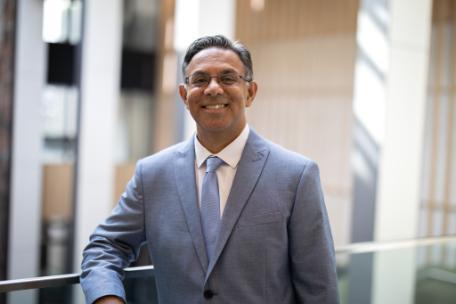WMCU has a combined total turnover of almost £1bn supporting nearly 100,000 students and staff – who remain and make a measurable impact on the regional economy. All three organisations have long established, historical roots in their respective three Cities fulfilling their role as true Anchor Institutions and contributing significantly to the development of these cities and the surrounding communities.
With a growing research base in key areas like engineering, construction, health and social care and social sciences and an impressive track record in supporting SME growth and innovation; WMCU provides a compelling suite of opportunities for collaboration and joint working.

Birmingham City University is a large, diverse and increasingly popular place to study, with over 23,500 students from 80 countries.
Incorporating a heritage that reaches as far back as 1843, Birmingham City University today focuses on practice-led, knowledge-based learning, providing students with access to cutting-edge facilities and real-world experience. Students are placed at the heart of everything the University does, giving them the best opportunities for future success.
Birmingham City University is the largest producer of creative professionals outside the South East, with an internationally renowned provision that includes both a specialist music conservatoire and drama school, as well as Europe’s largest jewellery school.
The University is currently investing £260 million in its facilities, including a major expansion of its largest campus, situated in the heart of the UK’s second city. It is also a major player in the regeneration of the long-neglected Eastside region of the city.
Professor David Mba
Professor David Mba joined Birmingham City University in October 2023 as Vice-Chancellor, previously he was the Deputy Vice-Chancellor, Research, Knowledge Exchange and Enterprise at the University of the Arts London (UAL).
Prior to joining UAL, he was Pro Vice-Chancellor, Research and Enterprise, at De Montfort University. Whilst at DMU he also held the post of Pro Vice Chancellor/Dean for the Faculty of Computing, Engineering and Media. Other roles he has held include, Dean of Engineering at London South Bank University, and Associate Dean at Cranfield University’s School of Engineering.
David studied Aerospace Engineering (1st class honours) and completed a PhD in Mechanical Engineering at Cranfield University, for which he was awarded the Lord King Norton Gold medal for the most outstanding doctoral thesis.
David is a Principal fellow of the HEA and is strongly committed to Social Justice. He is a trustee of the Stephen Lawrence Day Foundation, a member of Advance HE’s Equality, Diversity and Inclusion strategic advisory group, a member of the advisory board of the Association for Black and Minority Ethnic Engineers and more recently, a board member of the Hamilton Commission - set up to increase representation of Black people in UK motorsport.
Professor Mba’s research has been funded via numerous commercial, EU and EPSRC projects and he has published over 300 journal and conference papers.


With a history dating back to 1843, Coventry University is a provider of innovative teaching and learning with a focus on impactful research. Through global links with leading-edge businesses and organisations, opportunity and employability are priorities for its 40,000 students who also benefit from state-of-the-art equipment and facilities. Student satisfaction levels and teaching quality at Coventry have been rated amongst the best in the UK in recent years, leading to impressive rises in university league tables.
Coventry is confident in its mission, in itself and in its consistent execution and delivery of objectives, with partnership driven approach, which is entrepreneurial and sustainable – both financially and operationally.
John Latham – Vice-Chancellor and CEO of Coventry University
John is Vice-Chancellor and CEO of the Coventry University Group. John is a double graduate of the University and has a background in information technology and telecommunications. He previously worked for several private sector organisations including JHP Group, Jaguar Cars and BT - including a period as a sponsored Research Fellow based at Martlesham Research Labs, Ipswich. In 2015, John was awarded an Honorary Lifetime Fellowship of the British Computer Society for his services to the IT industry.
John has held high-profile roles at regional, national and European levels promoting innovation, technology and economic development. To that end he is an Advisor for Technology One and also Chair’s the Universities UK/JISC Software Negotiations and Strategy Group. He is a Director for the University Alliance mission group of universities and is a Non-Executive Director for Qualification Wales. John is additionally an advisory board member of the UK’s National Growth Board which is responsible for the oversight of the UK’s European Structural Funds Programme and most recently became a Member for the Integrated Care Partnership (ICP) for the Coventry and Warwickshire Integrated Care System, and also a Panel Member for the Home Team Academy based in Singapore. Previously, he has spent periods of time working overseas including roles in France, Spain, Portugal and Germany as well as being a long-term advisor to the European Commission.
John is an Extraordinary Professor in the area of enterprise and entrepreneurship at Stellenbosch University, South Africa, where in 2019 he received an Honorary Doctorate for his services to UK Higher Education. In the same year he was recognised in the Queen’s Birthday Honours with a CBE for his Services to Higher Education.
As a Non-Executive Director of the HEE Board, John Chaired the Audit and Risk Committee and was a member of the Remuneration Committee. He worked in partnership with HEE’s Regional Director in the East of England to ensure the Board maintained strong links with regional activities. Following the transition of HEE to NHSE, John is now a Non-Executive Director for the NHSE Workforce Training and Education Committee.
Most recently, John has been appointed by the Minister for Health and Social Care as an Independent Panel Member on the Advisory Assessment Panel for the Recruitment of members to NHS Bodies.


The roots of the University of Wolverhampton lie in the 19th century growth of Mechanics Institutes, providing vocational and general education for working men.In Wolverhampton the Free Library (1870) developed technical, scientific, commercial and general classes, while a School of Art, established in 1851, had been developed into the Municipal School for Art in new buildings by 1885. Becoming a Polytechnic in 1969, the University was set up in 1992.
As the University of Opportunity, Wolverhampton is committed to leading the regeneration of the West Midlands region, generating inward investment and engaging with business and industry. The University’s research has a real impact on society – whether investigating new treatments for cancer, studying the physical or psychological challenges involved in sporting success or looking at the issues surrounding organ donation.
Having recently committed to investing £250 million in new state-of-the-art facilities across its campuses in Wolverhampton, Walsall, Telford and Hereford, the University also has a global outlook, seeking out new opportunities for students, staff and graduates internationally, creating opportunities to access higher education and helping to develop the skills agenda.
Professor Ebrahim Adia – Vice-Chancellor of the University of Wolverhampton
Professor Ebrahim Adia joined the University of Wolverhampton as Vice-Chancellor on 1 October 2023.
Formerly Pro Vice-Chancellor (Academic Leadership) at the University of Central Lancashire (UCLan), Ebrahim has a national and international profile and brings to the role a wealth of experience, serving as Chair and member of a number of high-profile boards.
Ebrahim was born and raised in Bolton. He was the first in his family, and one of the few from his school to attend university, which has helped to shape his views on the role of higher education. As a result, Ebrahim has strived in both his professional and personal life to create opportunity and to help transform the lives of individuals and local communities. Ebrahim’s academic background is in public policy and policy analysis. He taught as a Lecturer and Senior Lecturer in Education for 18 years before moving into academic management. As the Provost for UCLan’s Burnley Campus, Ebrahim led on the development of a new campus and increased student numbers ninefold and as the Assistant Vice-Chancellor for Student Experience and Transformation at the University of Bolton he helped to improve both student satisfaction and student continuation.
Ebrahim was appointed as a Teaching Excellence Framework (TEF) Panel Member by the Office for Students which enhanced his understanding of best practice to support the development of an outstanding student experience that delivers high levels of graduate employability.
Ebrahim has worked closely with the devolved Greater Manchester Combined Authority where he held the role of deputy portfolio for Economic Strategy and Internationalisation and served as a Board Member of the Manchester Growth Company offering him excellent experience and understanding of working in partnership with public and private stakeholders to mutual benefit. He has also held a number of senior Board roles in the NHS, was appointed by the Government to the Commission on Integration and Cohesion and has served as a Rapporteur at the Council of Europe in Strasbourg.


